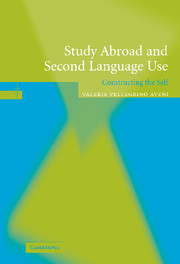Book contents
- Frontmatter
- Contents
- Acknowledgments
- Note on text conventions
- Abbreviations
- Introduction
- 1 Language use in a social context
- 2 The social dance: second language use and the construction of self
- 3 Learners and their environment: factors affecting self-construction
- 4 Coming into our own: the convergence of real self and ideal self
- Conclusion: The self in the second language: implications and next steps
- Appendix 1 Study context and research methodology
- Appendix 2 ACTR study-abroad program participants: 1995–1996 demographic profile
- Appendix 3 Participant profiles
- References
- Index
Appendix 1 - Study context and research methodology
Published online by Cambridge University Press: 06 January 2010
- Frontmatter
- Contents
- Acknowledgments
- Note on text conventions
- Abbreviations
- Introduction
- 1 Language use in a social context
- 2 The social dance: second language use and the construction of self
- 3 Learners and their environment: factors affecting self-construction
- 4 Coming into our own: the convergence of real self and ideal self
- Conclusion: The self in the second language: implications and next steps
- Appendix 1 Study context and research methodology
- Appendix 2 ACTR study-abroad program participants: 1995–1996 demographic profile
- Appendix 3 Participant profiles
- References
- Index
Summary
The data presented in this book were collected during a 1995–96 study-abroad program in post-Soviet Russia. Among myriad exchange and research programs, the nationally prominent organization, the American Council of Teachers of Russian, hosts students from all over the world at three institutes in Moscow and St. Petersburg, Russia. Students on this program attended classes, lived with native families (in “homestays”) or in dormitories, and went on regular excursions throughout the area. Basic information regarding participant cohort is provided in the Introduction and in Appendices and. The following sections provide greater detail concerning the research methodology used and the data collected for this study.
Data-collection process
During the 1995–96 academic year, I lived in Moscow and traveled frequently to St. Petersburg to observe and interview the American students. Like the students, I lived in a host family and went regularly on excursions and to class with them to observe them. The data I collected during this time were guided by three broad questions: (1) what factors facilitate or inhibit students' use of Russian as a second language in an in-country, non-classroom environment, (2) what are the strategies students employ either to use or to avoid using the language, and (3) what are the consequences of students' Russian language use or non-use in informal interactions, that is, how do the results oflearners' L2 use decisions in one interaction inform their choices in subsequent interactions?
- Type
- Chapter
- Information
- Study Abroad and Second Language UseConstructing the Self, pp. 151 - 157Publisher: Cambridge University PressPrint publication year: 2005



